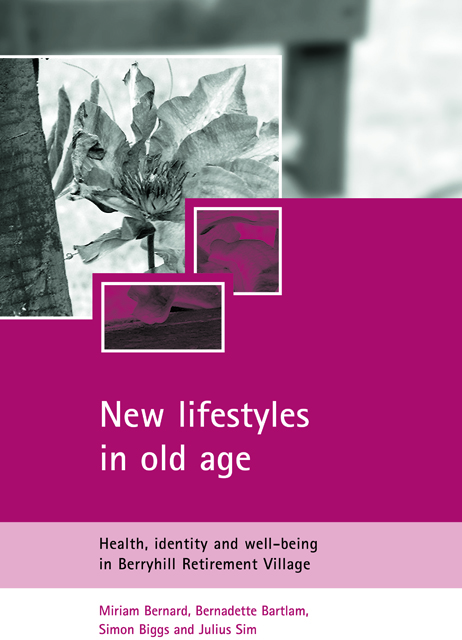Book contents
- Frontmatter
- Contents
- List of tables and figures
- Acknowledgements
- A day in the life of a retirement community resident
- 1 Retirement communities: the context
- 2 Developing a retirement community lifestyle: participation and involvement
- 3 Health and well-being
- 4 Growing older: age and identity
- 5 Conclusions
- References
- Appendix A Research questions
- Appendix B The study’s timeline
- Appendix C Questionnaires
- Appendix D Interviews
- Appendix E Participation groups and community conferencing
Appendix C - Questionnaires
Published online by Cambridge University Press: 06 April 2023
- Frontmatter
- Contents
- List of tables and figures
- Acknowledgements
- A day in the life of a retirement community resident
- 1 Retirement communities: the context
- 2 Developing a retirement community lifestyle: participation and involvement
- 3 Health and well-being
- 4 Growing older: age and identity
- 5 Conclusions
- References
- Appendix A Research questions
- Appendix B The study’s timeline
- Appendix C Questionnaires
- Appendix D Interviews
- Appendix E Participation groups and community conferencing
Summary
(i) Questionnaires to residents – the tools
Short Form-12
The SF-12 is a 12-item health scale adapted from the original version SF-36 (Ware and Sherbourne, 1992). It assesses eight dimensions of health: physical functioning, mental health, social functioning, role limitations because of physical problems, role limitations because of mental problems, energy/vitality, pain and general health perceptions. For each of the items scores are calculated on a scale from 0 (worst possible health) to 100 (best possible health). Two summary scores – the physical component summary (PCS) and the mental component summary (MCS) – can be calculated. The measure has been widely adopted and used worldwide.
Diener Satisfaction with Life Scale
The SWLS is a five-item scale that measures global life satisfaction. Respondents are asked to make judgements on how satisfied or otherwise they are with their life overall. It too has been widely used in research into well-being (Diener et al, 1985). Each statement is scored from one to seven, so that the range of scores is 5 (low satisfaction) through to 35 (high satisfaction).
CASP-19
The CASP-19 is a recently developed, 19-item, quality-of-life scale. It is currently being used in the English Longitudinal Study on Ageing (Hyde et al, 2003). It is based on the theory that quality of life should be assessed on the extent to which an individual’s needs are satisfied. It assesses four domains: control, autonomy, self-realisation, and pleasure. The range of scores is 0 (total absence of quality of life) through to 57 (total satisfaction on all four domains). When the study began, the CASP-19 was not available and so has been included only at Waves 2 and 3.
(ii) Questionnaires to residents – response rates
Wave 1 (2001): 159 residents/88 returns. Response rate = 55%
Wave 2 (2002): 175 residents/98 returns. Response rate = 56%
Wave 3 (2003): 169 residents/98 returns. Response rate = 58%
(iii) Questionnaires to family and friends – response rates
Eighty-three residents agreed that we could contact their relatives/friends. Of the 83 questionnaires sent, 36 were returned, a response rate of 43%.
(iv) Questionnaires to staff – response rates
Fourteen staff out of 38 returned questionnaires, a response rate of 37%.
- Type
- Chapter
- Information
- New Lifestyles in Old AgeHealth, Identity and Well-being in Berryhill Retirement Village, pp. 68Publisher: Bristol University PressPrint publication year: 2004



